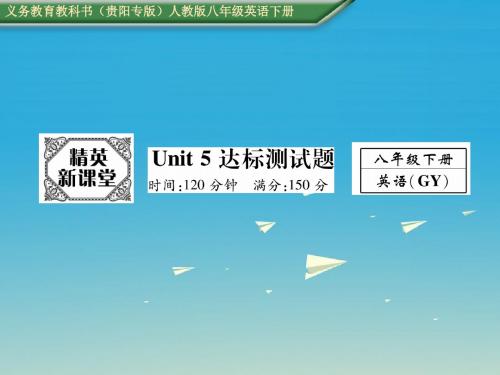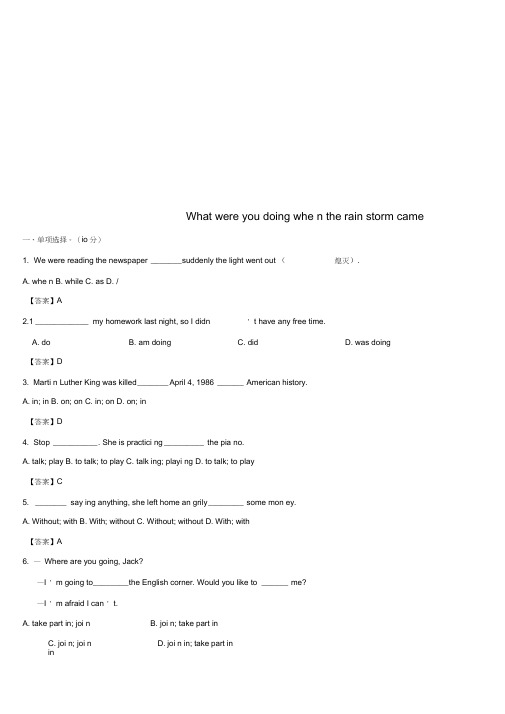贵阳专版2017八年级英语下册Unit5Whatwereyoudoingwhentherainstormcame语法专练课件
- 格式:ppt
- 大小:15.23 MB
- 文档页数:12

Unit5 What were you doing wneh the rainstorm came?1.What were people doing yesterday at the time of the rainstorm?昨天当暴风雨来临的时候人们正在做些什么?【解析1】过去进行时⑴ .用法:①过去某个时间正在发生的动作He was cooking at six last night. 昨天晚上六点,他正在做饭。
②过去某段时间正在发生的动作I was staying here from March to May last year.去年从3月到5月,我一直呆在这里。
⑵ .与过去进行时连用的时间状语,常见的有at nine last night/ at that time= then/at thistime yesterday /或有when the teacher came in/ while he was reading的提示⑶过去进行时的构成:was\were +现在分词⑷过去进行时的四个基本句型肯定句He was cooking at six last night.否定句He was not cooking at six last night.一般疑问句Was he cooking at six last night?两回答Y es ,he was. No, he wasn’t.特殊疑问句What was he doing at six last night?⑸过去进行时的固定句型Jim was reading when the teacher came in. 当老师进来的时候,吉姆正在读书。
Jim was reading while Kate was watching TV.在凯特正在看电视的同时,吉姆正在读书。
(while可以表示过去两个动作同时进行) Jim came in while Kate was watching TV.在凯特正在看电视的时候,吉姆进来了。


C. joi n; joi n inD. joi n in; take part inWhat were you doing whe n the rain storm came一、单项选择。
(io分)1. We were reading the newspaper _______ s uddenly the light went out (熄灭).A. whe nB. whileC. asD. /【答案】A2.1 ____________ my homework last night, so I didn ' t have any free time.A. doB. am doingC. didD. was doing 【答案】D3. Marti n Luther King was killed _______ April 4, 1986 ______ American history.A. in; inB. on; onC. in; onD. on; in【答案】D4. Stop __________ . She is practici ng _________ the pia no.A. talk; playB. to talk; to playC. talk ing; playi ngD. to talk; to play【答案】C5. _______ say ing anything, she left home an grily ________ some mon ey.A. Without; withB. With; withoutC. Without; withoutD. With; with【答案】A6. —Where are you going, Jack?—I ' m going to ________ t he English corner. Would you like to ______ me?—I ' m afraid I can ' t.A. take part in; joi nB. joi n; take part in7. —What did the teacher say?—The teacher told us at the Capital Museum on time.A. arriveB. arrivedC. arrivi ngD. to arrive【答案】D8 Song Zuying is one of the ____ sin gers in China.A. popularerB. popularestC. more popularD. most popular【答案】D9. —I didn ' t see you at the meeting yesterday. Why?—I _________ f or an importa nt teleph one call at that mome nt.A. waitB. waitedC. am waiti ngD. was waiti ng【答案】D10. —rm sorry to keep you wait ing for me so long.A. I don't thi nk soB. That's rightC. It does n't matterD. I'd love to【答案】C二、完型填空(10分)Nowadays more and more Chinese teenagers find life more difficult wi thout their parents. They don ' tknow how to do _【小题1 】.Because their parents do almost everything for them at home. This is a big problem.Joy is 14 years old. One day her parents went out, so she had to stay at home _ 【小题2】二At firstshe thought she would be happy _【小题3】_her parents were not in. She could do everything that she 【小4】_. But it was six o' clock in the after noon, she felt _【小题5 】_. “ Oh, it ' s time to have supper. Where can I get my food? ” she said to herself. Later she found some food in the fridge, but she _【小题6】_know how to cook. At that moment, she missed her _【小题7】_ very much. At last she could onlygo to the supermarket and _【小题8】_some food to eat. x*-k/wMany of teenagers are _【小题9】_as Joy. So I think they should learn somebasic (基本的)life skills,like cooking, tidying up their rooms or dressing themselves. _【小题10】live better in the _future, they shouldn ' t depend on(依靠)their parents too much. Sometimes they need to deal with something by themselves.【小题1 】A. their homework B. some shopp ing C. bus in ess D. housework【小题2】A. lonely B. aloneC. lovelyD. safelyOnce there lived an old man in a town. He always forgot a lot of things. So his wife always had to say to him, “ Don ' t forgetthis. ” One day he went for a long trip by train alone. Before he left home,his wife said,“ Now you have all these things that you need on your way. Take care of your things onthe way. ” He went to the station. He bought a ticket and got on the train with it . About an hour later,the conductor ( 列车员 ) began to see the tickets. He came to the old man and said ,“ Will you please show me your ticket? ” The old man looked for his ticket in all his pockets but he could not find it. He was very worried. “I can 't find my ticket. I really bought a ticket before I got on the train, ” said the old man. “ I think you are right. I believe you bought a ticket. All right, you don ' t have to buy another ticket, ” said the conductor kindly. But the old man still looked worried and said sadly, You don ' t know why I ' m worried. If I don ' t find my ticket, I can't remember my station. Where am I going?”根据短文内容判断正误,正确的用“ A ”表示,错误的用“ B”表示。

Unit 5 What were you doing when the rainstorm came课题Unit 5 What were you doing when the rainstorm came?Section A 1(1a2d) 课型新授课教学目标1.掌握重点单词和短语:rainstorm,ala rm,begin,heavily,suddenly,strange,at the time, go off,take a hot shower,pick up.2.掌握重点句式:1)what was the girl doing at the time of the rainstorm?she was doing her homework.2)when you called,I was taking a shower.but then I called again at nine .3.通过听、说、读、写等任务型活动,熟练应用词汇和句型。
重点1.重点短语和句型。
2.When和while的用法难点初步学习用进行时来表示过去某个时间在做什么教学用具录音机,多媒体。
教学环节说明二次备课复习Review新课导入Lead in课程讲授★Step 1 Warming upYesterday, there was a rainstorm. Where were they when the rainstorm came? Here are some repor ts.For example:A: Where were you when the rainstorm came? B: I was in the library.1a. Where were the people at the time of the rainstorm? Match the statements with the people in the picture.1. _____ I was in the library.2. _____ I was in my house.★Step 2 ListeningWhat were they doing when the rainstorm came?Let’slisten.Pay attention to “was/were doing”1b. Listen to the TV report and circle the correct response.a. doing my homework / studyingb. playing basketball /readingc. going to work / waiting for the busd. walking home /shopping2a .Listen and number the pictures 15.2b. Listen again. Fill in the blanks in the sentences in 2a. ★Step3 Speaking2c. Use the information in 2a to retell the story in aconversati on between the boy and a TV reporter.2d. Role play the conversation.★Step 4 Language points1. My alarm did n’t go off so I woke up late. alarmn. 闹钟e.g. What time shall I set the alarm for? 我该把闹钟拨到几点钟响?2. I was waiting for the bus when it began to rain heavily.1) begin v. (began) 开始e.g. I’ll begin whenever you’re ready.你什么时候准备好我就开始。